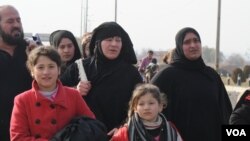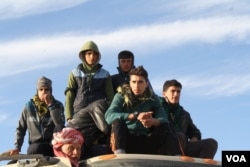“She was only 15-years-old, but we were afraid,” says Adiba, a mother of six at a refugee camp outside Mosul. “If she wasn’t married, we couldn’t say anything if militants wanted to take her.”
Adiba, like many parents from Mosul, feared that IS fighters could select her daughter as a wife, and married her to a relative in his late 20s six months after the militants took over.
And while IS-forced marriages never became widespread in now Iraqi-controlled eastern Mosul, the kidnapping and raping of thousands of Yazidi women under the guise of “marriage” was well known. This, along with harsh rules against male/female interaction, lack of jobs and closed schools drove an upswing in weddings in eastern Mosul during the two-and-a-half years of IS rule, according to residents.
“I own a salon, I can tell you this is true,” says Umm Safa, sitting with her daughter at a small jewelry shop in Mosul on Sunday. Female IS members confiscated all of their makeup, but brides still styled their hair on their wedding days under IS.
“They were all afraid Daesh would come to their homes and demand to marry their daughters,” Umm Safa adds, using the pejorative term for IS.
The weddings
Wedding hairstyles went largely unseen as brides wore black full-body and face veils over their white dresses. Mosul residents speak fondly of the days before IS, when brides wore white lace publicly and people could afford jewels.
A young couple wanders into the jewelry store, eying gold wedding bands. They married last year, when IS held their neighborhood. They didn’t have money for a ring. “I am a teacher,” the man explains. “I haven’t been paid in more than two years. But now IS is gone, I should get my salary and buy my wife a ring.”
Arab weddings are often raucous affairs, with blaring music, traditional dancing and large family gatherings going late into the night. But under IS, the parties were mostly subdued, with music and dancing banned and extreme poverty on the rise.
“Of course we didn’t play music,” says Adiba, inside one of the plastic tents holding many of the more than 160,000 people that have fled their homes since the current operations to retake all of Iraq from IS began in October.
Her 26-year-old son, Adel, interrupts, telling his mother not to be afraid. Far from IS militants, and without sharing photographs or other identifying information, he tells Adiba it is safe to admit to breaking IS rules.
“I wanted to play music at my brother’s wedding last year,” Adel explains.“Initially, Mom said no, but she later agreed, saying ‘lock the door and keep the volume low.’”
No talking to women
The brother was in his early 20’s when he got married, but he didn’t have a specific security concern, says Adel.
“He dropped out of college. There was no work,” he says, laughing. “What else was he going to do with his time?"
Other young men say suddenly losing all contact with female friends and relatives was difficult and they feared retribution if they broke the rules.
“It was like living in a prison,” says Omar, a 27-year-old baker, after a funeral in Iraqi-controlled Mosul. “And we were young men. We got married quickly so we couldn’t get punished for talking to girls.”
The punishment for talking or texting with women, excluding mothers, wives and sometimes sisters, was usually whipping and imprisonment, but punishments were not consistent across IS-held territory, or even across eastern Mosul.
Towards the end of IS rule, adds Amjd, 20, crouching in a tent at the refugee camp, militants became dramatically more violent, fearing local revolt as the Iraqi and coalition forces moved in.
“They could cut off your head for even talking to a girl,” he says. “If something happened physically between a man and a woman, they could be stoned to death or thrown off a building.”








